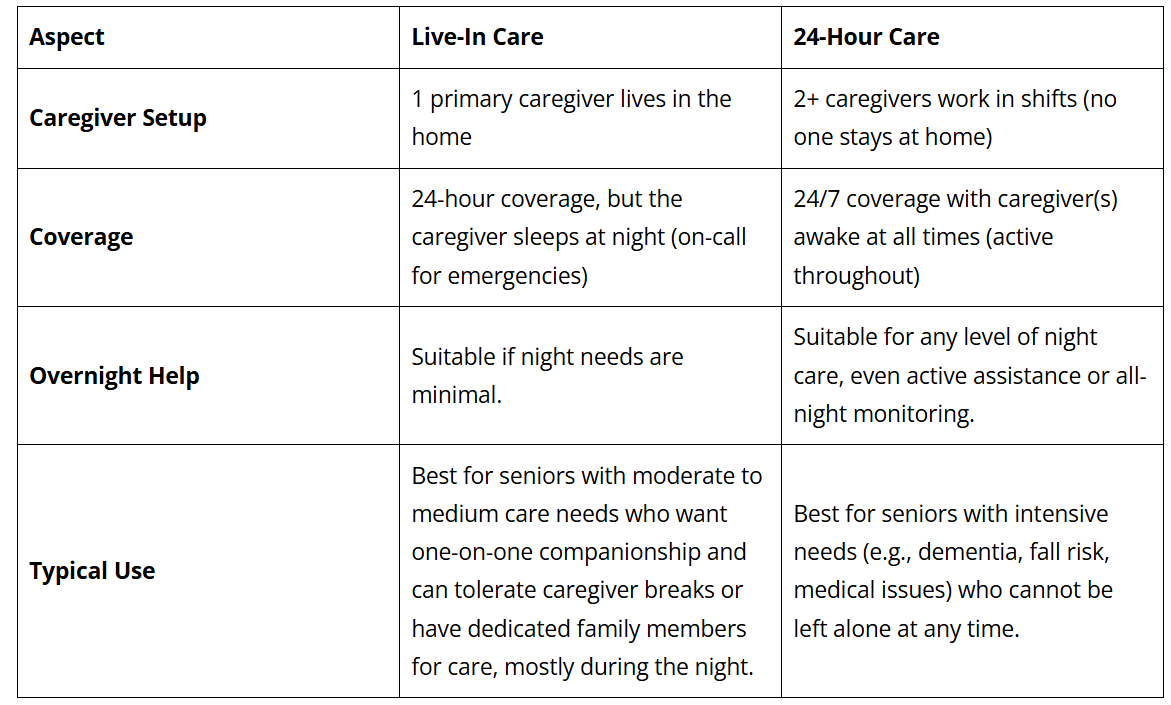When an elderly parent or loved one needs care or extra help at home, you may feel confused between two main options: live-in care and 24-hour home care (around-the-clock). This guide will explain both options to help you decide what’s best for your family.
As seniors face age-related health challenges, the thought of losing their independence can make them feel isolated and dependent on others. According to the AARP, nearly 90 percent of adults over 65 want to remain in their homes.
Luckily, there are ways to help elders stay safe and comfortable at home. Live-in and 24-hour care are the two most popular elderly home care services, which allow loved ones to age in their homes.
If you have questions like, “What is live-in home care or 24-hour care? “What’s the difference between them, and which is the best option for you? The blog will explain all this and more about home care options. Stay tuned.
What Is Live-In Care?
Live-in home care means a dedicated caregiver will live in your loved one’s home to provide support throughout the day and night. A caregiver generally helps with daily tasks like bathing, dressing, cooking, or keeping your loved one company. They will get an 8-hour sleep break and maybe a small day break (if available and needed). It’s like having a family member focused on your elder’s care and activities daily.
How Does Live-In-Home Care Work?

What Are The Services Provided In Live-In Home Care?
- Personal Care: Helping your parent or elder with bathing, grooming, or toileting so your loved one stays clean, safe, and comfortable.
- Companionship Services: Providing them with companionship through meaningful conversations and activities like reading, gardening, or playing games together.
- Medication and Nutrition: Keep track of the meal planning, cooking, and medication schedule, and remind your elder to take their medicine on time.
- Memory Care for Alzheimer’s & Dementia: Providing specialized care for seniors with Alzheimer’s or dementia to ensure safety and comfort. (It won’t be 24-hour care.)
- Mobility Assistance: Helping people with Parkinson’s or other mobility challenges with daily tasks and mobility support, like driving them to doctor appointments and social outings.
- Short-Term Relief for Family Caregivers: Offering a well-deserved break for family caregivers with temporary, high-quality care for your loved one.
Pros And Cons Of Live-In Care
Pros:
- One-On-One Familiar Care: In live-in home care, the same caregiver attends to your loved one daily. This builds trust and comfort between the caregiver and the elder.
- Cost-Effective 24/7 Support: Paying a dedicated care provider for live-in care costs less than paying for 24-hour rotating shifts with two to three caregivers.
- Minimal Disruption: Having one constant care provider is easier than having multiple providers. Your loved one can easily adjust and bond with one caregiver.
Cons:
- Home Accommodations: During live-in home care, the caregiver lives in the house, so they’ll need their own bedroom and space to rest. It might be challenging if your parents are uncomfortable with someone moving in or if the home does not have a spare bedroom.
- Nighttime Availability: Live-in care works best if your loved one sleeps through most of the night or only needs minimal help overnight. The caregiver is there for emergencies, but they aren’t expected to stay awake all night.
- Coverage Gaps: During the caregiver’s small breaks or days off, your elder might need coverage from a family member. This can work out if there is a clear schedule of the daily activities for the elder and the caregiver.
What Is 24-Hour Care, And What Does It Include?
24-hour home care is a service where multiple caregivers work to cover 24 hours of care for your elder. It means there will be an attendant to help for aging parents at home 24*7. In this arrangement, the care provider does not sleep at night; two or three people take rotating ( normally 8- 12 hour) shifts day and night to provide continuous support.
How Does 24-Hour Care Service Work?

What Are The Services Provided In The 24-Hour Care?
- Personal care: The care provider helps in bathing, grooming, dressing, mobility, and transfers, ensuring your loved one stays hygienic and comfortable (even at night).
- Companionship: Two or three care providers will care for your loved one and engage in conversations, activities, and games with them. It’s like having more friends to talk to and share things with.
- Supervision: A 24/7 care provider keeps your loved one safe from falls and injuries. The services also include overnight watchkeeping and managing late-night medical needs or emergencies.
- Specialized Care: 24-hour home care service includes specialized care for disabled adults or those with dementia. These caregivers are trained to deal with medical complications, fading memory of the elders, wandering, and other issues. They are also equipped to handle the urgent or frequent needs of Alzheimer’s patients and provide post-surgery home care.
Pros And Cons Of 24-Hour Care?
Pros:
- Energetic, Focused Caregivers: Caregivers work in shifts and are always fresh and ready to help.
- Total Peace Of Mind: You can have peace of mind that someone is always near your parents, ready to handle all kinds of emergencies.
- Ideal For High Needs: 24*7 care is the best option for elders with mobility issues or serious illnesses like Alzheimer’s.
Cons:
- Higher Expense: Having 24-hour care means paying for more than one caregiver, so it costs a little more than live-in care.
- Adjusting To Multiple Caregivers: Different caregivers will come in shifts during 24-hour care; it might take time for your loved one to get used to each one of them.
What Is The Difference Between Live-In Care And 24-Hour Care?

Live-In Care Vs 24-Hour Care: How to Make The Right Choice?
Assess The Extent Of Care Your Loved One Needs:
Make a clear assessment of the needs of your elder. See if they need only emotional care and mild help, or constant monitoring and support 24 hours a day.
Questions To Ask Yourself:
- Does your elder only need companionship?
- Do they need any help at night (even for toileting or medical care)?
| Note: If your elder is going through dementia, they will require specialized care. You will need a trained care provider to handle the elderly during wandering and a confused state, so make your choice accordingly. |
Talk To A professional:
Reach out to a professional elderly care service provider and talk to them. They can assess the needs of your elder and suggest the best care option.
Questions To Ask Professionals:
- What is the cost of each type of elderly care service?
- How many hours of care are provided in each service?
- What are the available payment methods?
Discuss With Family Members:
Family members can fill the gaps (personal breaks and sleep) of the care provider. Check with your siblings or relatives about the time they can spend with your elder.
Steps To Take:
- Schedule a family member to stay overnight when needed.
- Have a backup plan for unavailability or urgent situations.
Ask The Preference Of Your Elder:
Every elder is different. Some feel more comfortable with just one familiar caregiver, while others might not mind having multiple caregivers to chat with.
What To Do?
- Talk to your elder about both types of elder care in detail.
- Involve their input and preferences in the final decision.
| Tip: Go for a trial run (a month) for the suitable service and see how it works for you and your elders. |
How To Pay For Elderly Home Care?
Using Personal Funds:
Personal Savings: Many families use their personal savings, retirement accounts (like 401(k)s), and investments to pay for home care.
Renting your home: Some elders rent their home or move to ADUs adjoining the main property to cover the cost of home care.
Government Programs:
Social security or pension: If your elder gets social security benefits or a pension, it can help to cover part of the cost of living in care, but it won’t be sufficient to cover the full cost.
Medi-Cal: It is California’s version of Medicaid and covers many types of elder care, including personal care and household chores.
Veterans’ Benefits:
If your loved one is a wartime veteran or the surviving spouse of one, they might qualify for the Veterans’ Aid & Attendance benefit, which can pay for in-home care.
Insurance:
Long-term care insurance usually covers elderly care services. If your loved one has this insurance, it might pay for live-in or 24-hour care.
Note: Check with your elder’s insurance company for more details.
Installment Plans:
If you or your senior cannot afford the yearly cost of elderly care, talk to your home care service provider about a monthly installment plan.
Are You Considering Elderly Home Care?
Taking care of an elderly person is not easy and requires a well-trained professional, especially in the case of dementia or mobility issues. So, weigh your options and choose what best suits your requirements and budget.
At Bright Home Care Solutions, we understand the unique needs of elders and offer compassionate and professional home care services in Palm Desert. We can help you understand different care options and choose the best plan for your budget and your loved one’s needs.
Contact us today!





